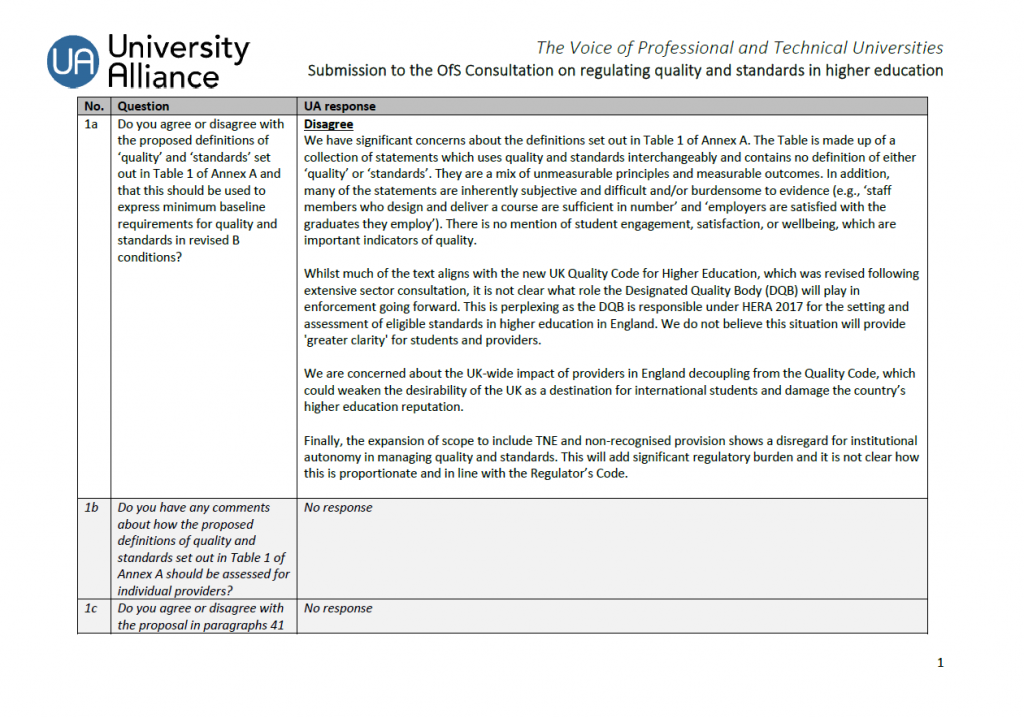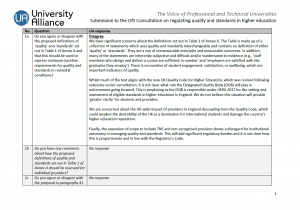UA response to OfS quality proposals
University Alliance has submitted evidence to the OfS consultation on regulating equality and standards in higher education. In principle we are supportive of moves to improve quality and standards in higher education in England. However, our members have significant concerns about a number of proposals in the consultation. Whilst we are justifiably proud of our student outcomes, and do not object to OfS making use of these in principle, the three indicators being proposed by Ofsted – continuation, completion and progression to skilled employment or further study – are too narrow and wholly metrics-based. We do not believe that data alone is ever sufficient to measure higher education quality.
Furthermore, we strongly disagree with the principle of absolute minimum baselines. The process of setting these is fraught with difficulty and is likely to have a wide range of unintended consequences. Student outcomes are very unevenly distributed across different groups of students, courses and employment sectors, and this approach would not serve to deliver quality for all students fairly. UA members are of view that baselines should be benchmarked as they are for the TEF. We do not accept the premise that benchmarking these indicators leads to students from underrepresented groups being expected to accept lower quality, including weaker outcomes, than other students. There is a multitude of evidence, including from the OfS, to show that both continuation and completion are closely linked to socioeconomic and family background. Students stop studying for a range of reasons, many of which are wholly unconnected to their experience of higher education. It would better reflect the performance of providers if an element of the distance travelled by students were introduced for these indicators.
There is a real risk that the measures will create further incentives for providers to make admission judgements based on likelihood of continuation and completion. These indicators are also at odds with government’s plans to increase modular and flexible HE provision, for example through the Lifelong Loan Entitlement (LLE). As the Dearing Report noted back in 1997, ‘non-completion will become an increasingly difficult concept to measure if more students undertake higher education programmes in a flexible way, over a long period of time.’[1]
In addition, we have serious concerns about the proposed progression indicator, which draws on new experimental statistics, the Graduate Outcome Survey. As currently constructed, it provides a narrow definition of success that does not fully capture progression into some careers e.g., the creative industries and humanities. There are many useful and fulfilling forms of employment, as well as entrepreneurial routes to success and societal contribution, that are not defined as managerial or professional employment.
We strongly disagree that the longitudinal educational outcomes (LEO) dataset should be used to provide further indicators in relation to graduate outcomes. We do not believe that average graduate earnings should be used by the regulator as a proxy for provider or course value. If 2020 has taught the world anything it is that salary is a poor measure of value, and even less of a proxy for quality. Moreover, many differences in student outcomes cannot be attributed to education. The Institute for Fiscal Studies has found that the earnings of graduates from poorer backgrounds are considerably lower, even conditional on studying the same subject at the same university. There are similar unexplained salary gaps based on gender and geography.
Alliance universities all have significant concerns that the proposals in this consultation will have unintended consequences for two core planks of our mission: delivering flexible, innovative higher technical provision and widening access to higher education for those who may not have considered or may not be able to undertake a study programme. Firstly, there is a significant risk that the measures will stifle innovation and make it more difficult for us to offer the flexible provision our communities so desperately need in the wake of the Coronavirus pandemic. Secondly, it is difficult to see how the proposals will not have an adverse impact on widening access and participation to higher education, rolling back the enormous amount of progress that has been made over the past several decades, and putting OfS access and participation targets in jeopardy.
For these reasons, we strongly advise OfS to reconsider these proposals. Student outcome indicators must be benchmarked (as they are in the TEF) and broadened to include an indicator measuring social mobility, as well as student engagement, satisfaction or learning gain. We call on OfS to work with us to ensure that the proposals do not have an adverse impact on higher technical education, apprenticeships, and modular and flexible provision that is vitally needed to support the post-pandemic recovery.
[1] The National Committee of Inquiry into Higher Education (1997), Higher Education in the learning society (London: Her Majesty’s Stationery Office), www.educationengland.org.uk/documents/dearing1997/dearing1997.html.





